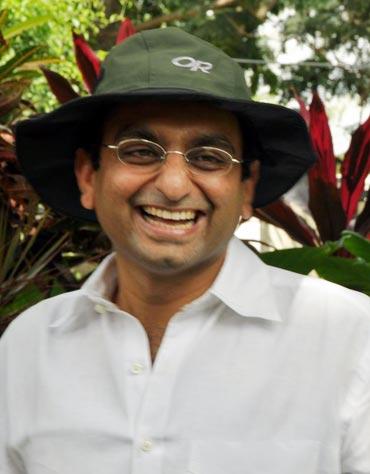 | « Back to article | Print this article |
Start-up story: 'We want to be the best network for singles'
Entrepreneurship comes naturally to Siddharth Mangharam. His love and passion for playing Nintendo video games back in 1989 led him to an idea. But to make it successful he needed some seed capital. Knowing fully well his mother will not refuse he approached her. While the money was given it came with a rider: First get the top rank in the school.
That accomplished, Siddharth got the money to buy a number of Nintendo cartridges that were then rented out to his friends for Rs 100 a day.
"When I liked the game and played it so much, there must be other people in the neighbourhood who too would want to play the game," says Siddharth explaining the rationale on which his idea was based.
In three months he earned Rs 10,000 on a seed capital of Rs 3,500.
More importantly, he learnt an unforgettable lesson from his mother's rider: Anything that comes for free is not valued.
And this lesson has held him in good stead at 37, when he is two start-ups old with two MBAs -- from Jamnalal Bajaj Institute of Management Studies in Mumbai and the Ross School of Business at the University of Michigan in Ann Arbor -- and has worked with multinational companies like McKinsey, Microsoft and Coca Cola.
While his first start-up Peek is into cloud computing, the second helps educated, urban singles connect with each other.
Siddharth, his wife Simran along with Sid Misra and Akshay Rawat came up with the business idea five months ago, and started Find Life Over Here (Floh), that offers singles in Bangalore a platform to meet each other.
Aware of the risks associated with such a venture, Siddharth and his team thoroughly screen those who apply for membership. They talk to singles who approach them before making them Floh members. Moreover, membership is by invitation only and you need to know someone who is already a member of Floh to refer you for membership.
The second screen is the membership fee and this is where the lesson he learnt in his childhood comes in handy.
"When you do anything for free two things happen," says Siddharth."People stop valuing what they get for free. And it attracts the wrong kind of crowd," he says.
Floh's subscription package starts at Rs 1,000 per month (if you buy a 12-month subscription). Members in turn get the privilege to meet, and find like-minded singles, and attend over 50 unique events (charged separately) a year.
Incidentally, Floh plans to increase the membership fee by 100 per cent within a few months.
A business that earns its money from membership fee would naturally look towards increasing the number of members.
Siddharth has a quick answer to that. "We are not chasing growth in terms of number of people who become members," he says. "It is a conscious decision we have taken to focus on becoming the best-run network for singles rather than be the largest network," he says comparing Floh's business model with that of dating and matrimonial web sites.
"Look at matrimonial and dating web sites. The first thing they would offer you is: meet five million singles. Arre baba I just want to meet one single person when I am single yaar (my dear friend) not five million singles," without trying to hide his loaded sarcasm.
"What happens when you view so many profiles online is that you start having an affair with your computer rather than getting into a relationship with someone real," he continues without changing his tone.
In this interview, Siddharth shares with Prasanna D Zore Floh's USP, why he quit the corporate world to become an entrepreneur, his success mantras, the challenges they face and dos and don'ts for start-up companies.
Start-up story: 'We want to be the best network for singles'
How did you come across the idea of starting Find Life Over Here?
Our single male friends are always complaining that there aren't any single women and our single women friends are usually wondering where all the single men have vanished! And yet, it's apparent that there is an abundance of single men and women around. The real issue is that there isn't a platform for them to meet. Very simply, Floh is a platform to bring single people together at awesome events with the objective of meeting like-minded people.
The name seems to suggest that people who flock FLOH had no life before joining it... Your comments...
Floh members are educated, urban and independent folks who have a number of interests. We have doctors, pilots, entrepreneurs, design professionals, teachers and even TED fellows as members, so they most certainly have a life! The name is just a play on words and it rhymes with Flow.
Also, we were really keen on a four-letter word so that it could be pronounced easily. An important consideration was also to ensure that the domain name was available. Our blog is called singleinthecity.in and that perhaps is an accurate description of our members.
What's so special about Floh? What's your USP?
Floh distinguishes itself across several sectors. The most important distinguishing aspect of Floh is that membership is by invitation only. You have to get an invite from somebody within the network to get in. Second, we screen each and every person who becomes a member.
This selective approach ensures that we maintain the high quality of our membership so that our members feel very comfortable at our events. Third, we don't believe that relationships can be arrived at by using a computer algorithm. People have to meet in real life to determine the chemistry between them and we enable this via our highly interactive events. We go beyond the basics to ensure that.
We ensure that the dynamics help keep conversation flowing and help members meet as many new people as possible without any awkwardness.
We spend about 100 man hours planning an event that may last just two hours. We see ourselves as leaders in applied human behaviour and our events borrow heavily from the ideas of evolutionary psychologists like Robert Wright (The Moral Animal), Dan Ariely (Predictably Irrational) and Richard Dawkins (The Selfish Gene).
You can say that Floh is the intelligent single person's solution to meeting like-minded people. You can read more about what inspires us on our blog www.singleinthecity.in.
We're not looking at becoming the most gigantic network in the country -- but the best platform for singles to meet.
'We're looking to become the best platform for singles to meet'
Isn't it odd that a married couple has started a web site that caters to singles in search of life/love?
On the contrary, our members know that we've been there, done that and that we truly understand the challenges of being single in urban India. This helps us design the Floh product using the insight of what's actually worked in real life. It's not a theoretical construct that we're using.
It's practical. It's real. And it also puts our members at ease.
What kind of challenges did you face while starting the company? How did you manage them?
The biggest challenge is in building a world-class team. This is true of Floh as well as of any other start-ups. We're four founders and each one of us has at least two previous companies that we've set up separately. Getting a group like this together is extremely rare.
Moreover, Sid Misra, our product guy, is currently pursuing his MBA at Harvard Business School and works out of his dorm room in Boston. The way we manage this is by communicating frequently and trusting each other.
Once you have competent folks on the team, that becomes easier, but it's something that we never take for granted and are constantly working on.
We are looking to grow the team and the bar for hiring will always be very high.
This is your second start-up, first being Peek India. What's the status of this mobile venture?
Peek is doing very well in India, US and Europe. They've embraced the cloud and have recently partnered with Micromax to provide push e-mail services on their entry-level QWERTY devices.
How do you plan to monetise Floh?
Floh is a subscription-based service. In the few months since we've launched, we've already seen many Floh couples being formed. Though the rule at Floh is that they have to leave the network as soon as they lose their single status, these couples are great proof that the approach we're taking works for this segment of the population.
You have had an illustrious career before you entered the start-up arena. McKinsey, Microsoft Coca Cola. Could you share with our readers your career progress?
Sure. I grew up in Bangalore and always knew that I'd run my own company. I have two MBAs -- one from Jamnalal Bajaj Institute of Management Studies and the other from The Ross School of Business at the University of Michigan in Ann Arbor. I must say that while the education and work experiences have been absolutely fantastic, they are not a requirement for becoming an entrepreneur.
'We're looking to become the best platform for singles to meet'
Did your MBAs add any value to your career and start-up?
Yes and no. My MBAs definitely got me the jobs that I ended up working at. You can't just walk-in at any of these companies without an MBA or some kind of education. So, education definitely helped me get there and earn experiences that I am leveraging at my companies but I say an MBA is not a requirement to become a successful entrepreneur.
But then again many MBAs are also running successful companies as entrepreneurs.
Why did you quit your various jobs? How did the entrepreneurial bug bite you?
Frankly, I was just tired of being a corporate whore and could see that the next 30-40 years could be pretty uneventful in a large company. I've always been entrepreneurial and never really 'fit in' with the corporate image.
Let me illustrate with an example: I've never cared about flying first class or business class -- for a lot of folks in the corporate world, this is an important aspect of what defines them. I don't think it's a bad thing -- it's just that it makes no difference to me and so I don't want to expend any energy on decisions like this. I want to build a company that delivers value to its stakeholders. Period.
Your success mantras...
- Simplicity over complexity
- When in doubt, use common sense
- Build a real business that delivers value and generates cash
- Do not be afraid to stick by your vision even if it means that you alienate people. I do this all the time
Career lessons...
- Don't be a slave at MNCs. For each person though the reality might be different. For some, MNC jobs could be the ultimate thing
- The skills that you develop in the corporate world may not necessarily be productive or value-generating skills. One of the skills that any person needs is to handle corporate politics. Does this skill add any value to the customer or the shareholder? The lesson here is if you find yourself learning more of non-value adding skills it is time for you to quit
Start-up dos and don'ts...
DO take a deep breath; it's a long journey. DO NOT worry about someone stealing your idea. Ideas are not only cheap, they're free. Execution is the key.
Your advice to other start-ups...
- Just do it. You'll have some hits, and you'll have some misses and that's perfectly normal. Enjoy the journey
- Iterate fast, keep learning, keep tweaking. When you think there's no more work required, set up your next entrepreneurial venture. Repeat.



